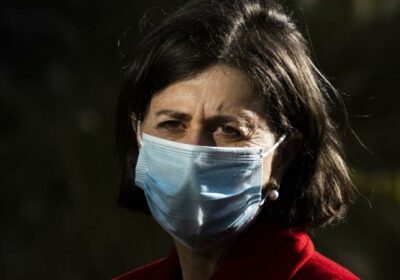What are the COVID-19 restrictions for the Greater Sydney lockdown?

For our free coronavirus pandemic coverage, learn more here.
The NSW government has announced a strict lockdown for all of Greater Sydney, the Blue Mountains, the Central Coast and Wollongong from 6pm Saturday until midnight Friday, July 9.
Premier Gladys Berejiklian said there was no point in having a limited three or five-day lockdown because “it wouldn’t have done the job”.
Residents and people who have worked in Woollahra, Waverley, Randwick and City of Sydney in the past two weeks have been subject to a stay-at-home order since 11.59pm Friday.
Due to the risk associated with an increasing number of venues where transmission has occurred, this order has been expanded to all of Greater Sydney, the Blue Mountains, the Central Coast and Wollongong until Friday, July 9.
People will only be allowed to leave their homes for one of four reasons.
- Shopping for food or other essential goods and services;
- Medical care or compassionate needs;
- Exercise outdoors in groups of 10 or fewer; and
- Essential work, or education, where you cannot work or study from home.
Anyone in regional NSW who has been in Greater Sydney since June 21 must also stay at home and isolate in order to stop the virus from spreading through the regions.
Weddings can proceed this weekend, but all weddings are to be cancelled from Monday, June 28 until the end of the lockdown. Funerals with a maximum of 100 people can proceed.
Health Minister Brad Hazzard foreshadowed a health order which will set out to employers a requirement that employees should work from home if possible.
“Employees, if possible, should be working from home. That’s a clear requirement to stop the movement around our communities,” he said.
Retail stores are not prohibited from opening.
Socialising
- Weddings can proceed this weekend, but all weddings are to be cancelled from Monday, June 28 until the end of the lockdown.
- Funerals with a maximum of 100 people can proceed.
Restrictions will also be imposed on regional NSW, with;
- No more than five visitors allowed in homes
- 50 per cent capacity at outdoor events
- Mandatory indoor mask-wearing
- One person per four square metres rule back for all indoor and outdoor settings.
Masks
- Masks will be mandatory in all indoor non-residential settings, including workplaces;
- Masks must be worn on public transport.
Public transport
- Social distancing via green dots on public transport will be reintroduced; and
- Masks must be worn on public transport.
Interstate travel
Victoria
Earlier this week, Victoria said it would expand its classification of NSW “red zones” to include all Greater Sydney and Wollongong from 1am Friday. It means non-Victorian residents are banned from entering the state while residents will have to obtain a permit and quarantine at home for 14 days. They will also have to get a COVID-19 test within 72 hours of entering the state, and receive a negative test result on day 13 before they are cleared to leave self-quarantine. The police presence along the border between Victoria and NSW will be significantly increased.
Queensland
Anyone who has been in Greater Sydney, the Central Coast, Blue Mountains, Wollongong and Shellharbour will not be able to enter Queensland without an exemption from 1am Thursday, June 24.
The hotspot declaration will not be backdated. It will apply to anyone that has been in the hotspot locations on or after 1am.
Those who can enter Queensland will need to complete 14 days quarantine in government arranged accommodation.
Western Australia
Western Australia has reintroduced its hard border with NSW, effective from 1pm AEST on Wednesday, Premier Mark McGowan has announced. Travel is no longer permitted without an exemption for residents of NSW. The change extends to those who’ve recently been in NSW.
Anyone arriving in WA from Wednesday will have to self-quarantine for 14 days.
South Australia
Effective immediately, South Australia on Wednesday afternoon announced it would close its border to NSW.
People who have been in NSW in the past 14 days will not be allowed to enter South Australia unless granted an exemption.
Tasmania
Tasmania is closing its borders to any traveller from Greater Sydney from 4pm Saturday, 26 June.
Northern Territory
Greater Metropolitan Sydney, the Blue Mountains and Wollongong have been considered COVID-19 hotspots, which means you must undertake 14 days of quarantine in supervised accommodation at the Alice Springs or Howard Springs quarantine facilities.
Australian Capital Territory
Anyone in the ACT who left Greater Sydney after 4pm on Friday is now subject to stay-at-home orders. They will only be allowed to leave their home to undertake essential activities until 11.59pm, July 2. Permitted reasons to leave the house include shopping for essential supplies, essential work that cannot be completed at home, medical care, care for the vulnerable, exercise for up to one hour a day and feeding animals. Sydney residents will not be allowed to travel to the ACT unless they gain an exemption.
Trans-Tasman bubble
New Zealand had paused its travel bubble with NSW for 72 hours after an Australian who travelled from Sydney to Wellington over the weekend tested positive to COVID-19. The pause came into effect on Tuesday night and was extended for a further 12 days.
The Morning Edition newsletter is our guide to the day’s most important and interesting stories, analysis and insights. Sign up here.
Most Viewed in National
From our partners
Source: Read Full Article